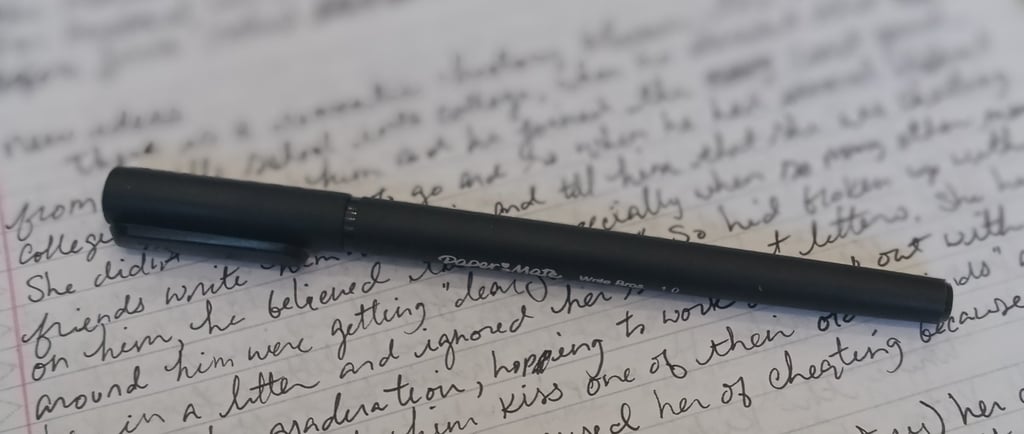How My Writing Journey Became My Journey of Healing
Our passions can also be our medicine
PHILOSOPHYWELL-BEINGWRITINGSELF-HEALINGPERSONAL TRANSFORMATIONPEACE
Heidi Hahe
6/22/20255 min read


Anyone who knows me relatively well knows that I am a writer. It’s such an integral and foundation piece of who I am that it’s difficult to know me and not know that writing and storytelling are my passions. I put my first complete story to paper in third grade and I haven’t stopped since.
However, there is also a painful past reality interwoven into my journey with my chosen craft because, when I was a younger woman, my writing was also a significant source of shame in my life. Having grown up in a conservative, religious household, I was convinced that writing the spicey, inclusive romance stories that I wanted to write was a sinful activity. I deleted and burned countless hours of work that focused on boys with boys, or girls with girls, or polyamory, or kink…or just sex, period.
Thankfully, I was blessed with a fantastic memory and I do remember the bones of those destroyed stories and I’ve been able to update some of them now that I’ve matured as a writer. And they’re mostly LGBTQ now 🙂
In college, I began to break out of that box, a little, using the age old author’s trick: the nom de plume, AKA a pen name. I fell in love with “fan fiction” and that unwittingly became my first conduit for writing authentic stories thanks to the anonymity on the websites I published on.
Unfortunately, it took me many more years to finally get to a point where I was fed up with trying to “write around” the stories I really wanted to write and I began to push past the voice in my head that told me that it was wrong. Boy, did that open a floodgate of subsequent realizations about other places in my life where I was holding myself back and living under limiting beliefs.
At that time, I had fallen for the idea that the “American Dream” wasn’t just real, but it was quite literally the path to having a good life. Except, I wasn’t having a good life. I was working my days away in an industry that I hated; yes, I made a decent amount of money, but at a cost that was higher than what I had been cognizant of until this time in my life. During the pandemic, actually.
During the pandemic, when my job became remote, I finally had time in my day to think about the pieces of my life that I didn’t like. And I didn’t like that, despite decades of writing nearly every day, I’d never pushed myself to really finish a novel. I hadn’t because I’d been telling myself that only special people got to be professional writers and I wasn’t special. Limiting beliefs all over the place.
I wanted that to change. I wanted to complete something. I wanted to write stories that I wanted to read, stories that I couldn’t find on the market. I wanted to write books that I could be proud of, that I enjoyed reading no matter how many times I read them. I researched perspectives from highly successful writers and, as I realized how often they would contradict each other, it made me understand that the true magic of good writing was being able to convey one’s own voice as authentically as possible. There weren’t as many rules as I had been made to believe.
If I wanted to write my authentic stories then I needed to be able to drop all of the restrictions that I had placed on my writing over the years. I began to realize that I hadn’t just put restrictions on plots and topics and genres, but I’d also been living with rigid ideas about how to write and put a story together in general. I had been getting so caught up in how I thought the process had to go that I was sabotaging myself in multiple ways without realizing it.
For example, I was convinced that I had to write down every single word of every single draft or version of my story–and keep it. I thought that I had to account for every aspect of a character's life and make sure that it all made complete sense and my timelines were perfect (and explained). I thought I needed to ignore the more “out there” stories because no one would want to read them. I thought that I couldn’t do genre mash-ups. Restriction, after restriction, after restriction. Time consuming restriction.
The more research I did, the more I began to understand that I needed to find my own way of going about the writing process. This was a foundational realization for my healing journey, too. Mediation only became helpful when I developed my own way of going about it. My physical fitness only became successful when I followed the modalities that left me feeling the lightest, like yoga and nature walks, instead of traditional calorie burns. My relationship with life drastically improved when I stopped following structured belief systems and united the helpful, common threads of those systems to create my own collection of beliefs.
It makes complete sense to me now, of course, that this was the key to authentic writing, but it also sparked the understanding that this was the way to be authentic in every aspect of my life. Just like I’d been given this idea that certain topics or plots or pairings were wrong, I was equally given the idea that those people were wrong in real life too. If I wanted to put love out into the world, then I wanted to put love into the world for everyone. I wanted to write and celebrate and represent everyone's stories and I wanted to love them IRL even more.
The parallels of my writing journey and my wellness journey aren’t a coincidence, not for me. Writing is such a deep part of who I am that I’m not surprised that it was the conduit for my healing. It was the outlet I used to express what was in my heart, the stories I desperately wanted to tell or the things I couldn’t say out loud about myself. The more that I allowed myself to fully express those stories, my story also began to change.
I believe that there can be great healing on the path of pursuing one’s deepest passions. I would even argue that this journey is the purpose of the human experience, in the macro sense. Passion looks different to different people and that’s exactly how it should be. But if denying our passions and denying our expression can lead to depression and anxiety and other mental health disorders, then it stands to reason that living in our purpose can help us heal from them.
Now my writing isn’t just authentic, it’s incredibly inclusive–although I do tend to focus on bisexual characters or characters with more nuanced sexuality. Not to pander to an audience of people who think representation matters, but because I personally understand why it does. I didn’t see bisexual characters in movies or television shows or in books when I was trying to understand how I could really like boys, but also have these feelings for girls that, no matter how many mental gymnastics I would play, I knew weren’t just friendship.
Without the desire to write inclusive stories, I honestly don’t know if I ever would have had the courage to come out to my husband. And if I hadn’t done that, I wouldn’t have been able to fix the struggle I was having with my sexuality in general. If I hadn’t worked on those struggles, I wouldn’t have the beautiful sex life that I have with my husband today. And improving our sex life, improved our already good marriage into a truly great one.
Because I now have a deep, peaceful, loving, healthy relationship with my husband, I can now write deep, peaceful, loving and healthy relationships for my characters. That is the energy that I want to put out into the world, not just with my books, but with my actions, my reactions and my words. Everyday.
And writing got me there.
